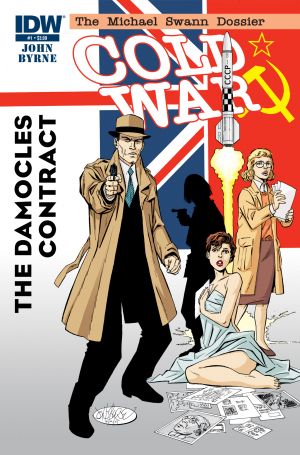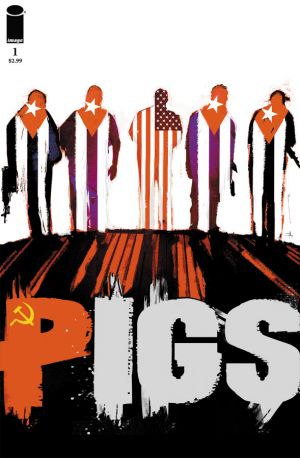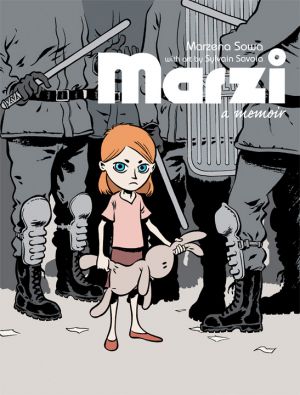Comics /
Spotlight /
Progressive Panels
Nostalgic Cold War Comic Books
By Andy Frisk
November 3, 2011 - 20:07
Anyone in their mid 30s and up will most likely remember where they were when the horrifying made-for-TV movie The Day After (1983) aired. They also will remember former President Reagan’s multiple Oval Office press conferences from the same time period about potential Soviet missiles being parked in Central America. They also will most likely remember where they were when they heard that The Berlin Wall came down. I remember these things, and I remember the first two scaring the living Hell out of me, and the last greeting me with a sense of hope for the future. I can only imagine what fears my parents lived through in the 1950s and early 1960s when A-Bomb drills were commonplace in school. For me, the Cold War years were ones fraught with fear, not just of nuclear annihilation, but of being dominated by Godless commie dictators, who in the end turned out to be nothing more than stuffed shirts who couldn’t hold their own regimes together. These fears were played out in movies, television, and in popular sequential art and written fiction. Nearly all of them portrayed things as we in the West saw them. As fears alleviated and new fears arose after such events as the War in the Balkans and 9/11, Cold War fears and the fiction it inspired, some of which was thoughtfully humorous at best (Dr. Strangelove), and nightmarishly horrifying at worst (The Day After and the even more frightening Threads (1984)) dissipated as well. In 2011, these humorous and horrifying Cold War scenarios don’t carry much weight as they never came to fruition, hopefully because the horror of films like The Day After and Threads helped scare straight the military industrial complexes of the two superpowers. There has recently been a revival of fiction set during the Cold War though. Several examples abound and range from the thoughtful and insightful, like X-Men First Class (which I fully dive into an analysis of here), the less threatening and War on Terror era referencing Pigs from Image Comics, the Ian Fleming inspired Cold War spy adventure, John Byrne’s Cold War, and the thoughtful and introspective Marzi from DC Comics’ Vertigo imprint. All of these works are steeped in Cold War atmospherics, but which of these, if any, serve as truly insightful or informative works on a time period that most of today’s youth and young adults have no recollection of? Let’s face it, today’s youth will retain more about world history as it is presented in pop art form rather than from their formal education. So, what do these works say of any import about this important, but quickly fading, time period?
 |
One of the comic books most irrelevantly classified as a “Cold War Comic Book” is also one of the most recent. John Byrne’s Cold War from IDW Publishing owes more to the “likes of Ian Fleming and John Le Carre. With maybe a little John Steed around the edges” (John Byrne’s own words) than to anything actually historic, beyond the time period setting. His chronicles of the adventures of freelance former British MI6 agent Michael Swann are much more in the vein of the modern rebooted James Bond a la
Casino Royale (2006) than anything serious…at least yet. What Byrne captures exquisitely well in
Cold War is the late 1950s early 1960s British cultural atmosphere with its classic car racing clubs, low tech espionage gear, attitude, and dress. In this aspect it is a visual history lesson. Byrne has yet, as of this writing, to get anywhere near the presentation of a complex type of political plot, like the exploration of Communist vs. Capitalist idealism or similarly important themes, though. There’s plenty of time for Byrne to delve into these topics if he wishes, but writing a series about a James Bond type character and calling it
Cold War just seems to be a little misleading to those searching for some of that intelligent, and at times controversial, Byrne storytelling.
Cold War might be a fun read, but it’s hardly profound.
Image Comics’
Pigs, written by Ben McCool and Nate Cosby with interior art by Breno Tamura, roots itself in a realistic Cold War event that leads to the birth of the characters spotlighted in
Pigs: a group of 2nd generation Soviet sleeper agents tasked with toppling the American government…20 years after their mission logically should have been abandoned. While the series focuses on a series of fictional Soviet sleeper agents and their mission, it takes its cues from, references, and even borrows its title from a real Cold War event that had dramatic affects on Cold War politics, some of whom believe even lead to the Cuban Missile Crisis: the spectacularly incompetent and failed invasion of Cuba dubbed, by the Kennedy Administration, as the Bay of Pigs Invasion. Here McCool and Cosby at least offer their readers something, at least by way of a tease, of a history lesson on the Cold War by referencing the Bay of Pigs. They also deftly have set themselves up with a scenario that allows them to comment directly on the clashing of ideologies, terrorism, and an unwilling settling into a culture that ends up robbing one of one’s original ideals (like the one sleeper agent who refuses to go along with the mission as he has settled into living the American Dream too comfortably). These topics are all relevant to today’s political culture and “War on Terror” era, but also can potentially serve to remind us that these types of conflicts have existed for hundreds of years, and that the players in these conflicts have simply worn different ideological masks. Cultures clash, and will again and again until the world learns to live and let live…
Pigs harbors the promise of eventually being a more worthy read than
Cold War though because of its potential for allowing some interesting and intelligent stories to develop, Stories that might actually teach its readers something, even if it’s only the names of actual Cold War historical events.
Marzi, by Polish native Marzena Sowa and artist Sylvain Sovoia and published by DC Comics’ Vertigo imprint is yet another "Cold War Comic Book" that has recently been published. Translated from its original language and publication,
Marzi tells the story of the author’s formative years behind the Iron Curtain. Life in 1980s Poland was harsh. Goods and personal freedoms were scarce, and horrors like the Chernobyl accident were real causes for concern.
Marzi beautifully and insightfully captures a child’s wonder at the world around her and her growing sense of having a part to play in it though. It is also a brilliant and important documentation of just how the world has changed since the end of The Cold War, and for the better for millions. The hardships faced by Marzi and her father are a thing of the past for most Eastern Europeans, but while life is definitely better under capitalism, there is still great economic hardship. The war against Communism has been won, and many have benefitted economically and politically, but the war against the lingering poverty and rampant culture of criminality that existed behind the Iron Curtain, and still reigns in some areas, needs waging.
Marzi is a touching, and realistic, reminder of a system of totalitarianism that failed only to be replaced by a system of cronyism and crime that still keeps many living in the type of poverty that Marzi lived through. In this aspect, out of all the recent nostalgically Cold War themed comic books written, drawn, and published,
Marzi is one of the most important, intelligent, and worthy of a mass audience.
The Cold War Era might be fast fading from the collective consciousness of the men and women who lived through its latter years and death throes, but the lessons of those years are still as important and worthy of attention by today’s youth as they ever were. Movements that define an “us vs. them” mentality, or allow for a mass manipulation of peoples’ attention or ideals is always worth a revisiting analysis. While it’s great to see Cold War themes and settings popping up more and more frequently in pop culture, there simply isn’t enough
Marzi types of works out there yet. Hopefully, with the success of
Marzi, we’ll see more.
Last Updated: August 31, 2023 - 08:12



